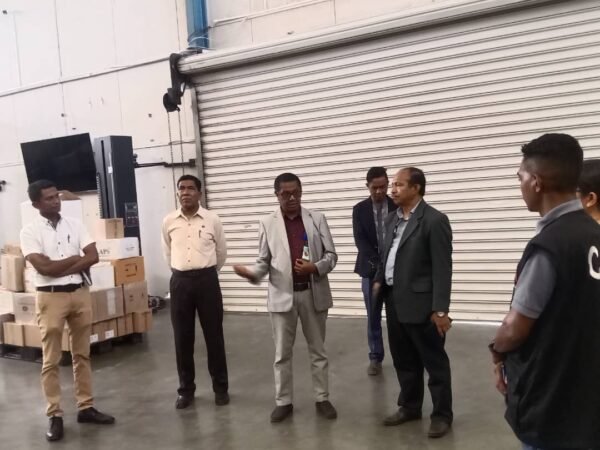Dili, November 27, 2024 (Média Democracia) – CAC made a surprise visit to the National Institute of Pharmaceuticals and Medical Products, Timor-Leste (INFPM) to directly observe the condition of medicines in the INFPN warehouse.
CAC Commissioner Rui Pereira said the purpose of the visit was to examine the concerns of the public and politicians regarding medicines.
“Today we are getting closer to seeing the real conditions in INFPM about the medicines and also how the distribution guidelines are, because a few days ago we met with the HNGV Directors, one thing that was noted by the commissioner was that there were questions from the public about medicines, sometimes private clinics have them, but why doesn’t HNGV? There needs to be control.” Said commissioner Rui Perreira
He informed that in the future, INFPM will conduct studies on medicine and basic courses with positive results to be produced domestically.
“So, medicines that have basic ingredients that are available in Timor-Leste, then there are companies that can produce them domestically, for example malaria medicine, the basic ingredients are abundant and that is good,” he said.
He noted that the INFPM plan was good, but it came back to the government’s desire to invest in order to reduce the purchase of medicines from abroad.
He emphasized that this barcode is very important because it can detect goods when people bring goods from one place to another country, without having to pay at the cashier.
“Because big stores that store goods, put barcodes, there are people who go out without paying, then the barcode will detect. Now, employees or doctors take things out, and the barcode can detect how they don’t feel embarrassed.” He said.
For this reason, the Commissioner requested the INFPM Manager to have responsibility in managing medicines from the national level to the grassroots level, because politicians and civil society are always concerned about the problem of medicines shortages, so the Manager needs to pay attention to this problem.
As the Executive Director of INFPM, Brigido Simão Dias de Deus said that currently something has been resolved, so that the public does not have too many questions, especially regarding stock-outs.
“The current medicines stock is in good condition. This mdicines has 24% of the vital, essential and necessity categories, so the drug stock is guaranteed until February to March 2025,” he said.
Therefore, CAC recommends that INFPM install a barcode and CCTV system to ensure that drugs are not lost in the warehouse, so the INFPM team has contacted the company to place the system in that place and install it in the warehouse for easy supervision.
The Executive Director explained that regarding the running out of medicines stock, this must be seen at INFPM because when the medicines comes in, it is immediately sent to the hospital.
“For example, the 25% stock here is not permanent, look at the out-of-stock basis in how many municipalities INFPM received information that now most medicines are short of stock by 15%, maybe last week in HNGV there were also 11% or 12%, that’s a normal situation, then there if the situation is good, in INFPM there is a shortage of stock if there is, they try to fulfill the shortage.” He explained.
He said, to address the stable stock of medicines, there must be careful planning because the plan is not an INFPM plan.
“The Ministry of Health’s plan is to collect information from health centers and posts in Timor-Leste into data, so that based on the data it will be submitted to INFPM to be purchased based on funds received by INFPM.” He added.
INFPM Executive Director Brigido Simão Dias de Deus asked the government to think about creating a special procurement law for purchasing medicines in order to make the work at INFPM easier, especially how training for these medicines can be better.
Reported by : Estefania
Picture by : Estefania

